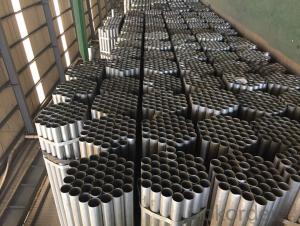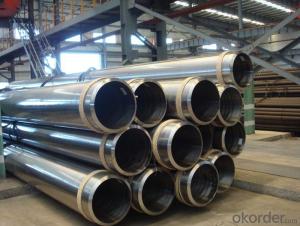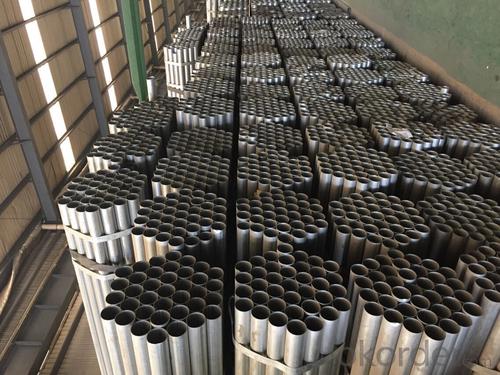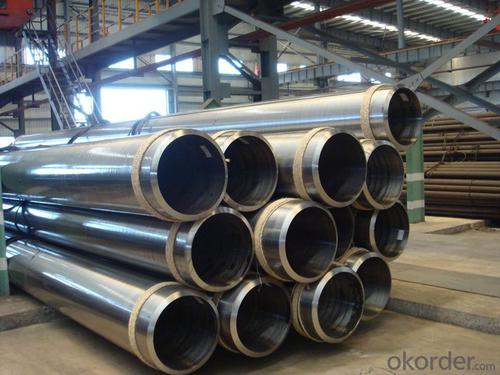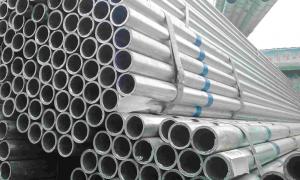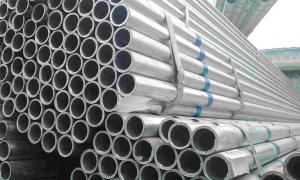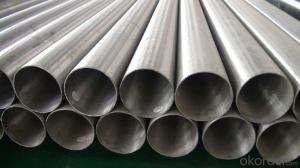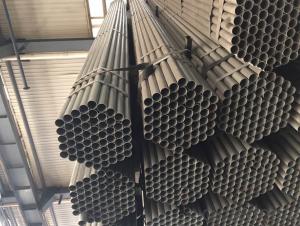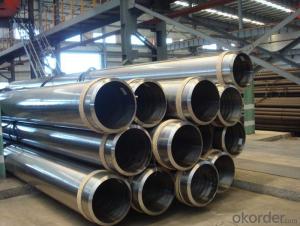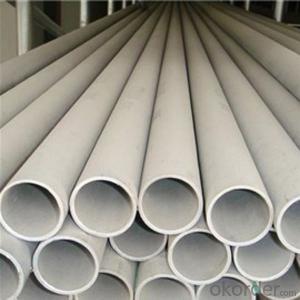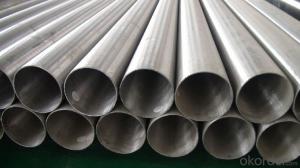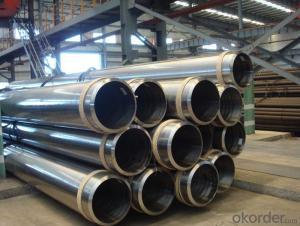Stainless Steel Welded Pipe ASTM A358/A312
- Loading Port:
- China main port
- Payment Terms:
- TT or LC
- Min Order Qty:
- 25 m.t.
- Supply Capability:
- 40 m.t./month
OKorder Service Pledge
OKorder Financial Service
You Might Also Like
1、Structure of /Stainless Steel Welded Pipe ASTM A358/A312Description:
Stainless steel welded pipe is actually a cover term, covering a wide range of alloy and making them suitable for different attributes that are used in a very wide and large numbers of different industries.. It can be molded, rolling, and it can create amazing shapes to make it perfect, It is used as experimental buildings, The use of steel pipe welding of large stainless steel covers other examples.
2、Main Features of the Stainless Steel Welded Pipe ASTM A358/A312:
• High manufacturing accuracy
• High strength
• Small inertia resistance
• Strong heat dissipation ability
3、Stainless Steel Welded Pipe ASTM A358/A312Images:
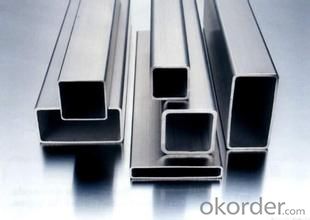
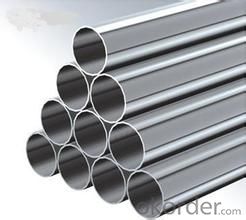
4、Stainless Steel Welded Pipe ASTM A358/A312/A778 Specification:
Size:
| Outside diameter | Outside | Thickness | ||||
| SCH 5S | SCH 10S | SCH 20S | SCH 40S | |||
| (A) | (B) | mm | mm | mm | mm | mm |
| 350 | 14′ | 355.6 | 3.96 | 4.78 | 7.92 | 11.13 |
| 400 | 16′ | 406.4 | 4.19 | 4.78 | 7.92 | 12.7 |
| 450 | 18′ | 457.2 | 4.19 | 4.78 | 7.92 | 14.27 |
| 500 | 20′ | 508 | 4.78 | 5.54 | 9.53 | 15.09 |
| 550 | 22′ | 558.8 | 4.78 | 5.54 | 9.53 | 15.09 |
| 600 | 24′ | 609.6 | 5.54 | 6.35 | 9.53 | 17.48 |
| 650 | 26′ | 660.4 | 5.54 | 7.92 | 12.7 | 17.48 |
| 700 | 28′ | 711.2 | 5.54 | 7.92 | 12.7 | 17.48 |
| 750 | 30′ | 762 | 6.35 | 7.92 | 12.7 | 17.48 |
| 800 | 32′ | 812.8 | 7.9 | 12.7 | 17.48 | |
| 850 | 34 | 863.6 | 7.92 | 12.7 | 17.48 | |
| 900 | 36′ | 914.4 | 7.92 | 12.7 | 19.05 | |
| 1000 | 40′ | 1016 | 9.53 | |||
Tolerances on dimensions table:
| Standard | Outside(mm) | Thickness(mm) | Length(mm) | |
| ASTM A312 | ≤48.26 | -0.4 | +No special provisions(Unspecified)-12.50% | Appoint LengthDefinite cut length+6.40 |
| >48.26~114.30 | 0 | 0 | ||
| >114.30~219.08 | 0.8 | |||
| >219.08~457.20 | 1.6 | |||
| >457~660 | -4 | |||
| >660~864 | -5 | |||
| >864~1219 | -5.6 | |||
| JIS G3459 | <30.00 ±0.30≥30.00 ±1.00% | <2.00 ±0.20≥2.00 ±10% | Appoint LengthDefinite cut Length | |
| GB/T 12771 | <13.00 ±0.2013.00~40.00 ±0.30≥40.00 ±0.80% | ≤4.00 +0.50 -0.60>4.00 ±10% | 20 | |
| EN 10217-7 | D1±1.50% with±0.75mm(min)D2±1.00% with±0.50mm(min)D3±0.75% with±0.30mm(min) | T1±15.00% with±0.60mm(min)T2±12.5% with±0.40mm(min)T3±10.00% with±0.20mm(min) | ≤6000 +5.00 -06000~12000 +10.00 -0 | |
| D4±0.5% with±0.10mm(min) | T4±7.50% with±0.15mm(min) | |||
| T5±5.00% with±0.10mm(min) | ||||
| EN ISO 1127 | ||||
5、FAQ of Stainless Steel Welded Pipe ASTM A358/A312/A778:
①How is the quality of your products?
Our products are manufactured strictly according to national and internaional standard, and we take a test on every pipe before delivered out. If you want see our quality certifications and all kinds of testing report, please just ask us for it.
Guaranteed: If products’ quality don’t accord to discription as we give or the promise before you place order, we promise 100% refund.
②How about price?
Yes, we are factory and be able to give you lowest price below market one, and we have a policy that “ for saving time and absolutely honest business attitude, we quote as lowest as possible for any customer, and discount can be given according to quantity”,if you like bargain and factory price is not low enough as you think, just don’t waste your time.Please trust the quotation we would give you, it is professional one.
Any question, pls feel free to contact us !
- Q: What are the different types of steel coatings used for pipes?
- There are several types of steel coatings used for pipes, including epoxy, polyethylene, polypropylene, and fusion bonded epoxy (FBE) coatings. Each of these coatings provides different levels of corrosion resistance and protection, making them suitable for various applications and environmental conditions.
- Q: How are steel pipes used in tunnel construction?
- Steel pipes are commonly used in tunnel construction for various purposes. They are used to provide structural support by acting as reinforcements or casings for the tunnel walls. Steel pipes also serve as conduits for utilities such as water, gas, and electricity within the tunnel. Additionally, they can be used for ventilation and drainage systems, ensuring a safe and functional environment inside the tunnel. Overall, steel pipes play a crucial role in the construction and functionality of tunnels.
- Q: What is the maximum diameter of steel pipes?
- The maximum diameter of steel pipes can vary depending on the specific needs and requirements of a project. However, steel pipes are commonly available in diameters ranging from 1/8 inch to 72 inches or even larger.
- Q: Are steel pipes resistant to impact?
- Yes, steel pipes are generally resistant to impact due to their high strength and durability.
- Q: What are the different coating options available for steel pipes?
- There are several different coating options available for steel pipes, including epoxy coatings, polyethylene coatings, zinc coatings, and asphalt coatings. These coatings are applied to the exterior of the pipes to provide protection against corrosion, abrasion, and other environmental factors. Each coating option offers different benefits and is chosen based on the specific requirements of the project or application.
- Q: Can steel pipes be used for underground chemical pipelines?
- Yes, steel pipes can be used for underground chemical pipelines. Steel pipes are widely used in various industries, including the chemical industry, due to their durability, strength, and resistance to corrosion. When selecting steel pipes for underground chemical pipelines, it is important to choose the appropriate grade of steel that is resistant to corrosion from the specific chemicals being transported. Additionally, proper coating and lining techniques can further enhance the resistance of steel pipes to chemical corrosion. Regular inspection and maintenance are also necessary to ensure the integrity and safety of the underground chemical pipeline system.
- Q: Seamless steel pipe 8162 and 8163 what is the difference?
- GB 8162 is the structure of the tube, there is no need for flaw detection, the use of mechanical processing, stents;
- Q: What kind of argon arc welding wire is used for 16Mn steel pipe?
- 16Mn steel belongs to carbon manganese steel, the content of carbon is about 0.16%, and the yield point is equal to 343MPa (strength grade is 343MPa). 16Mn steel alloy content is less, good weldability, welding generally without preheating. But because the 16Mn steel hardened tendency is slightly larger than the low carbon steel, so at low temperatures (such as winter outdoor operations) or welding in high rigidity, large thickness of the structure, in order to prevent the cold crack, need to take measures to preheat.
- Q: Steel pipe is particularly long, how to clean the inner wall of the pipe so that it can be thoroughly cleaned
- The urban water supply pipeline cleaning is a very necessary work, it can not only improve the transmission efficiency of pipeline to reduce energy consumption, but also to clear the pipeline dirt, remove two pollution, improve water quality, protect the people's physical and mental health.
- Q: How are steel pipes marked for identification?
- Pipe marking is a process used to identify steel pipes. This process involves placing labels or markers on the pipes' surface to provide important information about their specifications and characteristics. The labels typically include details such as the size, grade, material composition, manufacturer's logo or name, and any relevant codes or standards. These markings are crucial for proper identification and ensure that the right pipes are used for specific applications, as well as for maintenance and repair purposes. Furthermore, the markings also assist with quality control and traceability, making it easy to identify and track the pipes throughout their lifespan. In summary, using clear and durable marking systems to identify steel pipes is vital for safety, efficiency, and compliance in various industries where these pipes are used.
Send your message to us
Stainless Steel Welded Pipe ASTM A358/A312
- Loading Port:
- China main port
- Payment Terms:
- TT or LC
- Min Order Qty:
- 25 m.t.
- Supply Capability:
- 40 m.t./month
OKorder Service Pledge
OKorder Financial Service
Similar products
Hot products
Hot Searches
Related keywords
